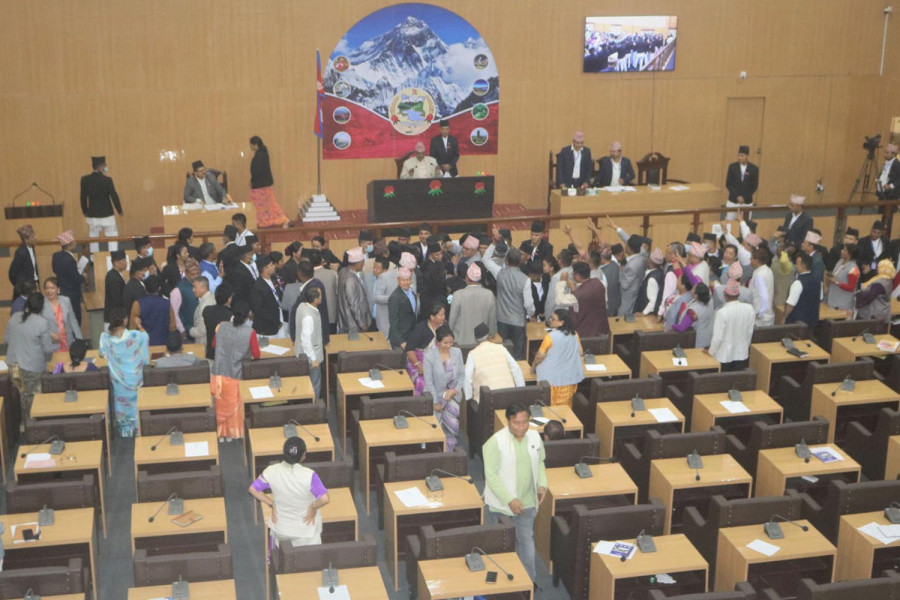Politics
Koshi Chief Minister Thapa passes floor test using questionable means
Whether someone who chairs the assembly can vote has surfaced as a point of contention between political parties.
Nishan Khatiwada
Koshi Chief Minister Uddhav Thapa secured a vote of confidence in the provincial assembly on Monday. Of the 77 lawmakers present at the meeting, 47 voted in favour of the motion tabled by the chief minister while 30 voted against it. Sixteen lawmakers representing the CPN-UML and the Rastriya Prajatantra Party remained absent.
“I declare that the motion for a vote of confidence tabled by Chief Minister Uddhav Thapa in accordance with Article 168(4) of the constitution has been endorsed with a majority,” said Israil Mansuri, who chaired the provincial assembly meeting on Monday.
Deputy Speaker Srijana Danuwar had called the meeting and scheduled the floor test. But she left for Kathmandu early on Monday “for medical treatment”. Mansuri of Nepali Congress then chaired the provincial assembly as a member of the four-member presidium.
If both the Speaker and the Deputy Speaker resign from their posts or are absent during the meeting, one of the four members of the praesidium should chair the provincial assembly, according to the Koshi Province Assembly Regulations. The quad comprises Congress’s Mansuri, Maoist Centre’s Geeta Timsina, RPP’s Ambar Bahadur Bista, and UML’s Malati Kumari Limbu.
Thapa won the vote of confidence with Mansuri as one of the signatories.
After Mansuri cast his vote in the floor test, the assembly turned tense as lawmakers from the opposition parties, the UML and the RPP, encircled the rostrum and shouted slogans against the chair’s vote.
Even though Thapa secured a vote of confidence, whether someone who chairs the assembly can vote has surfaced as a point of contention. Ruling coalition and opposition leaders remain divided over the matter.
Talking to reporters following the floor test, Hikmat Karki, former chief minister and UML parliamentary leader of the assembly, said the ruling coalition has violated the constitution and laws. “We will now proceed to take legal and constitutional actions as the move violates the constitution and laws,” Karki said.
On the other hand, the ruling coalition leaders claim that the chief minister won the vote of confidence as per the constitution and law. Speaking at the provincial assembly meeting on Monday, Rajendra Rai and Indra Bahadur Angbo, parliamentary party leaders of the CPN (Unified Socialist) and the Maoist Centre, respectively, claimed the constitution allows the lawmaker chairing the provincial assembly to cast the decisive vote.
Congress’ provincial assembly party leader Thapa was appointed as the chief minister of Koshi on August 1 after the resignation of Speaker Baburam Gautam. Gautam resigned as Speaker earlier in the day, ensuring the candidate from the alliance of parties including the Congress and the Maoist Centre will have majority votes to stake claim to the government.
The Koshi provincial assembly is 93-strong and to form a new government, 29 lawmakers from the Congress, 14 from the Maoist Centre, four from the Unified Socialist and one from the Janata Samajbadi Party submitted their signatures to the provincial head. The opposition parties, the UML and the RPP, have 40 and 6 lawmakers, respectively.
While the party leaders remain divided over Monday’s vote, constitutional experts’ opinions differ as well.
Constitutional expert Bipin Adhikari said anyone chairing the provincial assembly in place of the Speaker or deputy Speaker cannot sign or vote in a floor test. “The court has already explained that the Speaker cannot sign in the government formation process,” he said. “It applies to anyone chairing the assembly. Now the political parties are repeating the same game.”
Adhikari added: “The essence of the position [chair of the provincial assembly] is clear that they cannot vote.”
Chandra Kanta Gyawali, another constitutional expert, however, disagrees. According to him, only the Speaker and deputy Speaker cannot cast the decisive vote in the government formation process as they have to quit their party affiliation following their election.
“If the senior-most lawmaker or any member from the presidium chairs the provincial assembly, they do not give up their party roles and are accountable to the party whip. They can thus cast a vote during the vote of confidence,” he said.
Since last year’s provincial elections, Koshi Province has been struggling to maintain stability. Of late, the province has also witnessed violent protests by various ethnic groups, demanding its name be changed to reflect its ethnic identity.
Adhikari stressed the need for having a stable government in the province as per the election mandate, independent of the federal politics. “The political parties’ actions hint that they are not serious about stability in the province,” he said. “They have been forming a government based on ‘plus-minus one lawmaker.”




 20.9°C Kathmandu
20.9°C Kathmandu















